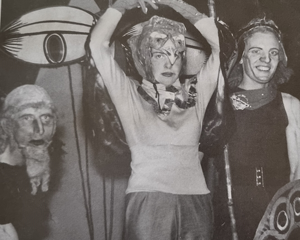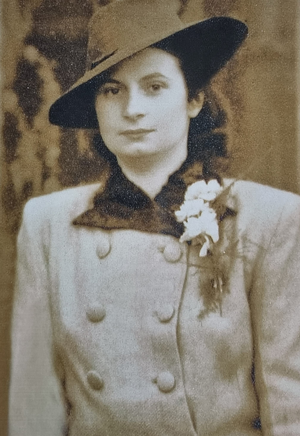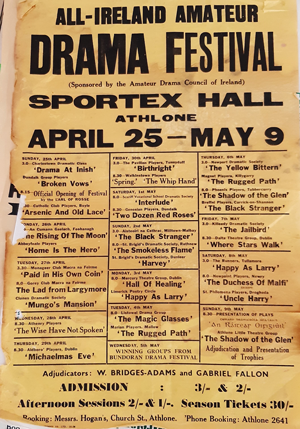THE RTÉ ALL-IRELAND DRAMA FESTIVAL, 1953–2023
Published in Issue 3 (May/June 2023), Reviews, Volume 31By Fiona Brennan
Micheál Mac Liammóir, the co-founder of the Gate Theatre, was a steadfast advocate of the Irish amateur dramatic movement. Writing in Theatre of Ireland in 1950, he declared that amateur drama should not be ‘overlooked in the dramatic history [of Ireland]’ because it enabled those ‘players or public, isolated from life of the big cities, [to] receive their first experience [of theatre]’. Mac Liammóir’s astute observation was well founded and based on personal experience as a young actor with Anew McMaster’s theatre company—one of Ireland’s illustrious travelling troupes, affectionately known as the ‘fit-ups’—and later as an adjudicator at amateur drama festivals.
For most of the twentieth century, the amateur dramatic movement reflected the experiences of provincial Ireland’s theatre-going public. In the aftermath of the Civil War it played an increasingly integral role in Irish society. By the 1930s the Roman Catholic Church’s condemnation of people frequenting the cinema and dancehalls had reached near-hysteria. The enforcement of the ‘Lenten ban’ during the pre-Easter season halted such activities. People turned instead to amateur drama as an acceptable means of socialising, and dancehalls were assimilated as theatre spaces, resonating to the sounds of dramatic performances to capacity audiences.
The impetus by members of the amateur dramatic fraternity to hone their artistic skills and improve overall production standards led to the establishment of the Irish Amateur Dramatic Association in 1932. When the Association failed to attract sufficient support, individual drama groups founded competitive festivals. By 1946 festivals had been established at fourteen centres throughout the country. Competitions were divided into various categories, including full-length and one-act plays, incorporating the much-sought-after New Writing award. Adjudicators from the professional theatre included the Abbey Theatre directors Lennox Robinson, Ria Mooney and Tomás MacAnna, amongst others. They extolled the benefits of competition and the valuable opportunities yielded to participants to improve artistically and possibly to transition to the professional stage.
The Irish economy was particularly reliant on tourism, and entrepreneurially minded figures like Josephine Albericci, the founder of the Kerry Drama Festival in Killarney in 1943, believed that festivals could provide economic opportunities when integrated into the tourism calendar. Seán Lemass, who was minister for industry and commerce from 1951 to 1954, proposed the establishment of a national cultural tourism festival. In 1953 the first ‘An Tóstal’ (‘Ireland at home’ festival), sponsored by Bord Fáilte (the Irish Tourist Board), was aimed at attracting greater numbers of American visitors to Irish shores; 172 communities across the country developed innovative cultural programmes, which included theatre and drama. An Tóstal failed in its overall aspirations and the last festival was held in 1958. Thankfully, two spin-off theatre events—in both the amateur and professional spheres—continued independently: the All-Ireland Amateur Drama Festival, founded in 1952, and the Dublin Theatre Festival, which began in 1957.

Above: The Runners drama group, Tullamore, Co. Offaly, winner of the 1955 verse-play category with The Dreaming of the Bones by W.B. Yeats. (Athlone All-Ireland Festival Committee)
Athlone, Co. Westmeath, was chosen as the venue for the All-Ireland Drama Festival, and the Amateur Drama Council of Ireland (ADCI) was established to oversee it. Subsequently, the ADCI’s remit was extended to oversee all local festivals. The inaugural All-Ireland Drama Festival took place in April 1953 and a season ticket costing £1 admitted one to a total of 30 productions by 25 individual groups. By some accounts, off-stage drama also ensued amongst the panel of three adjudicators, which included Gabriel Fallon, Maureen Delaney and Lennox Robinson.
During the Festival’s formative years An Chomhairle Ealaoín (Arts Council) provided a substantial grant towards its running costs. With the eventual reform of the Council’s funding criteria the Festival became ineligible for grant aid. In 1959, a year synonymous with the success of the Listowel Drama Group’s production of John B. Keane’s Sive, the Esso Company came on board as the Festival’s main sponsor. By then it had become a seventeen-day event with some 35 participating groups. Unsurprisingly, the requirement for reform became urgent. By 1964 the full-length and one-act competitions had become two separate entities. Eventually, the newly established Drama League of Ireland (DLI) would assume responsibility for the one-act competition. Under the auspices of the ADCI, the full-length competition was reorganised as a two-tier system to include both ‘Open’ and ‘Rural’ sections. This evolved once more when the latter was reclassified as the ‘Confined’ section, to facilitate the participation of less-experienced groups and to entice newcomers to the circuit. All competitions are now league-based, and each group must compete in a number of local festivals—of which there are 37—in order to accumulate a sufficiently high number of points to qualify for the All-Ireland finals. Athlone continues to host the annual full-length Open Festival, while a different centre hosts the full-length Confined Festival every year.
Since 1953 audiences and drama enthusiasts have continued to flock to Athlone for the Open Festival, and an extended fringe programme includes workshops, historical tours, exhibitions and various entertainments. A schools’ playwriting competition is open to transition-year students. The Festival is endorsed by both the Abbey Theatre and RTÉ, which has proved decisive in its innovative expansion. The Abbey Award was reconvened in 2011 to acknowledge the Abbey Theatre’s historical associations with the amateur movement. The Award is presented as an invitation to one of the groups to stage its production at the Abbey’s Peacock Theatre during the summer months.
In 2004 RTÉ assumed the title sponsorship, which ensures the national prominence of the Festival. The RTÉ All-Ireland Drama Festival under the auspices of the ADCI is, according to Tom Maguire, the former head of RTÉ Radio, not just valuable in terms of the arts per se but also vital in ‘tapping into local communities in every corner of this island’.
On this occasion of the 70th anniversary of the first Athlone Festival it is an opportune time to acknowledge the amateur dramatic movement’s contribution to Irish life. The amateur dramatic tradition is one of Ireland’s most under-appreciated cultural legacies. As an integral aspect of Irish social, cultural and theatre histories it is surely deserving of an ambitious programme of archival research, documentation and preservation for future generations.
Fiona Brennan is co-editor (with Neil Buttimer and Gabriel Doherty) of The art and ideology of Terence McSwiney: caught in the living flame (Cork University Press, 2022).


















